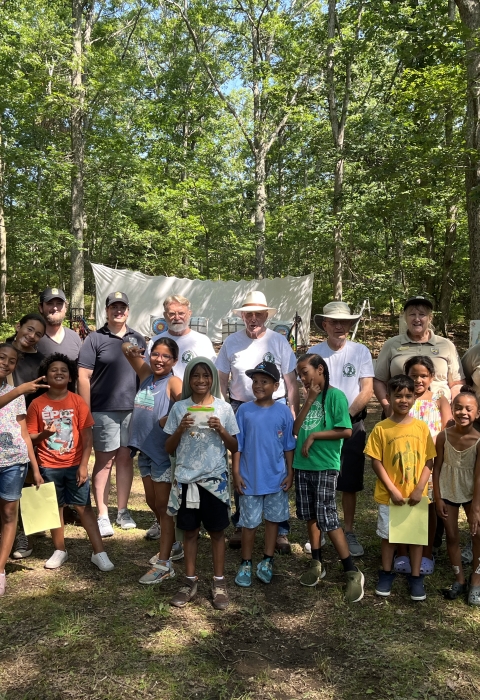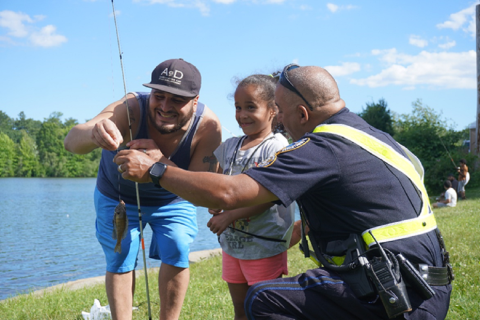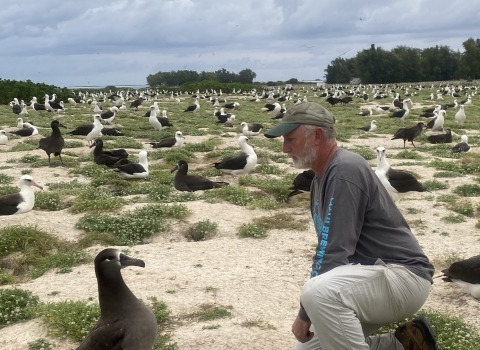This Partnership aims to develop and implement an inclusive and cohesive environmental awareness and education program by bringing messages to students and families where they live and work in over 120 parks, schools, and the zoo. Learn more about the Providence Urban Conservation Partnership and Urban Bird Treaty City.
Celebrating Over Twenty Years of Co-stewardship and Hosting Successful Indigenous Youth STEM Mentoring Camps at Ninigret National Wildlife Refuge!
Conservation partners, including Tomaquag Museum, the Northeast Canyons and Seamounts Marine National Monument and Mystic Aquarium, working together to co-steward and to offer an inspiring Indigenous Youth STEM Mentoring Camps at Ninigret National Wildlife Refuge.
Indigenous youth experimented with new engineering and science concepts. Who knew making a pompom launcher could be a great lesson in energy designs and yet so much fun to make? The Service and its partners shared collective conservation work such as native plant restoration, shorebird protection, conservation breeding, sustainability, nanotags and the importance of the Northeast Canyons and Seamounts Marine National Monument. The youth also had fun fishing, seining, hiking, and kayaking. These young scientists and engineers expanded their knowledge in environmental stewardship to protect their wild places and wildlife.
Vamos a Pescar/Let’s Go Fishing Series via Stepping Stones of Engagement
The Vamos A Pescar/ Let’s Go Fishing event series took place for the 3rd year during the summer of 2023. This series is centered around the USFWS Standards of Excellence, notably “use stepping stones to engage people in nature”. Through this program, families are introduced to fishing in a familiar setting at a well-known pond located in a Providence park. Families are then encouraged to join in on saltwater fishing and riverside fishing at sites 20 minutes outside of the city, culminating in an offshore fishing trip on a chartered vessel. All programs are bilingual hiring and training local youth leaders to provide guidance and education at various stations in both English and Spanish. This series not only bring families together annually to enjoy these programs, but welcomes new families to learn fishing skills together, year after year.
This program is funded through the George H. W. Bush Vamos a Pescar Education Fund and brings together a myriad of partners, the Services’ Coastal Program, Division of Law Enforcement, and Visitor Services, Division of Fisheries, Division of Wildlife, and Division of Law Enforcement of RI Department of Environmental Management, City of Providence’s Parks Department, Partnership for Providence Parks, Woonasquatucket River Watershed Council, National Parks Service, Providence Police Department, Saltwater Anglers Association, Hispanic Access Foundation, and Rhode Island Chapter of the Federal Law Enforcement Officers Association
In addition to the events listed above, families were encouraged and attended attend state-wide fishing programs such as USFWS ‘Take Me Fishing Day’ at Sachuest Point National Wildlife Refuge. Read more about Vamos a Pescar and Take Me Fishing Day here.
Creating an Urban Bird Habitat at Providence’s Station Park Outside of the Amtrak Station
Through the work of the Rhode Island NWR Complex, Providence Urban Bird Treaty City, staff and partners from the Service, Providence Parks Dept., RI Wild Plant Society, and University of Rhode Island Master Gardner Program, over 2,500 native seedlings were planted at the newly renovated Amtrak Station Park on Oct. 20. Amtrak Station Park is a major gateway between Providence and other cities – welcoming visitors and locals to experience native species as they enter and leave Providence. As an urban bird treaty city, Providence is committed to supporting the health and wellbeing of birds that reside in or visit the city. An interpretive sign teaches visitors the importance of providing food and shelter for native and migrating urban birds, while creating a relaxing place for visitors to enjoy “nature in the city”. This urban park will be a valuable asset for environmental education programs while creating urban wildlife habitat.



